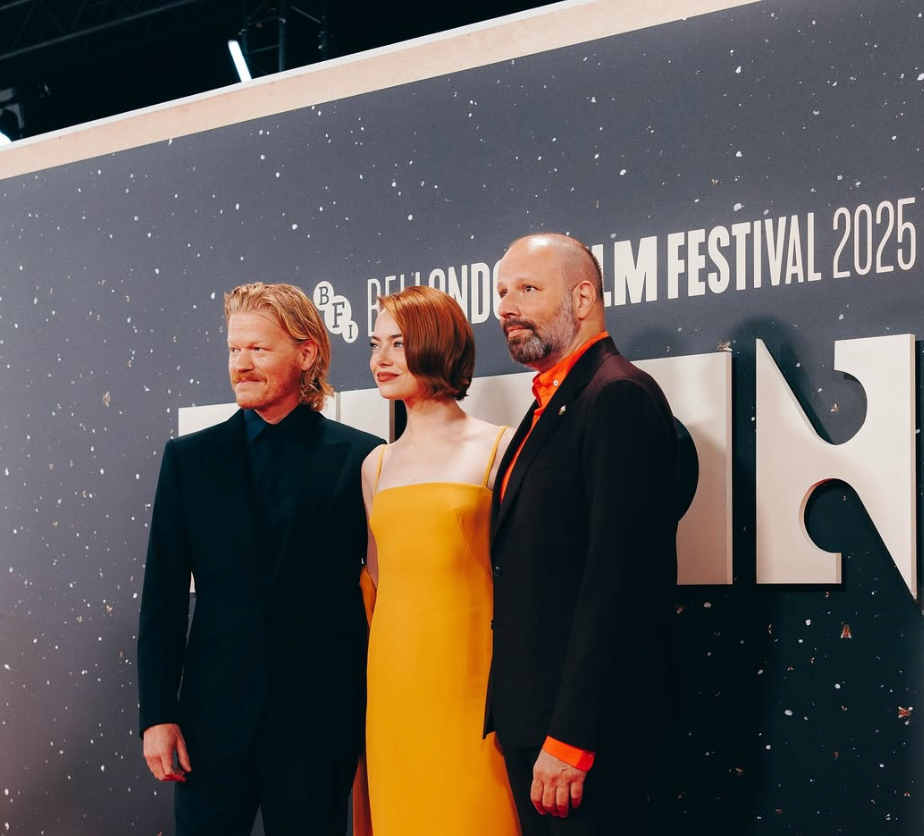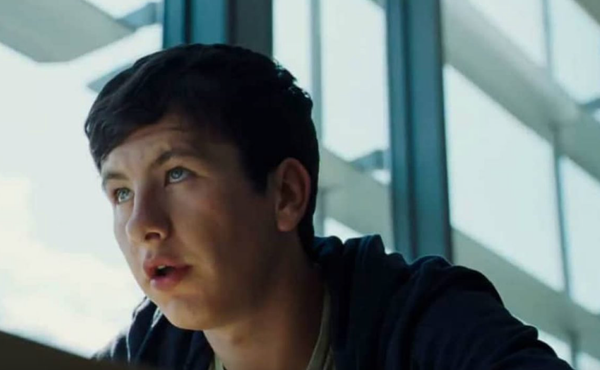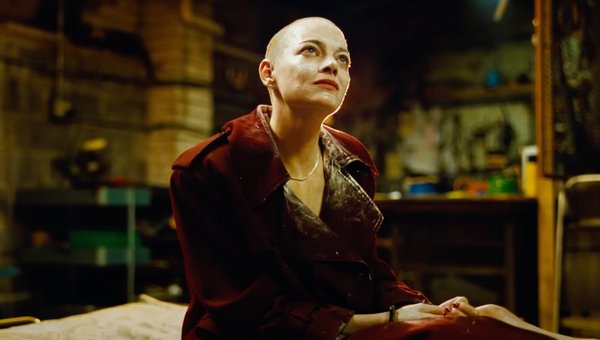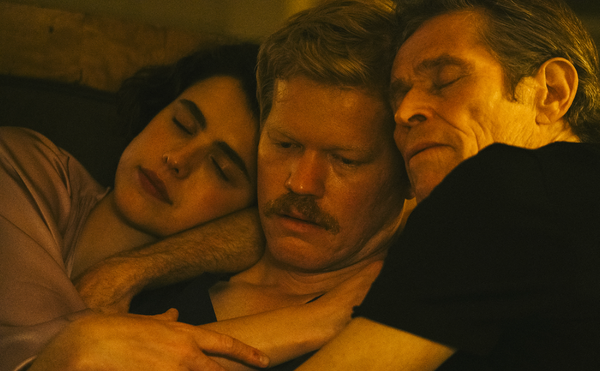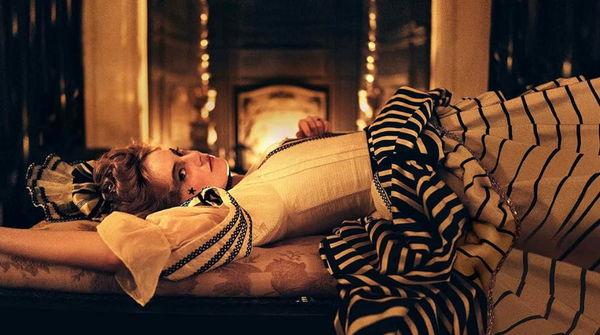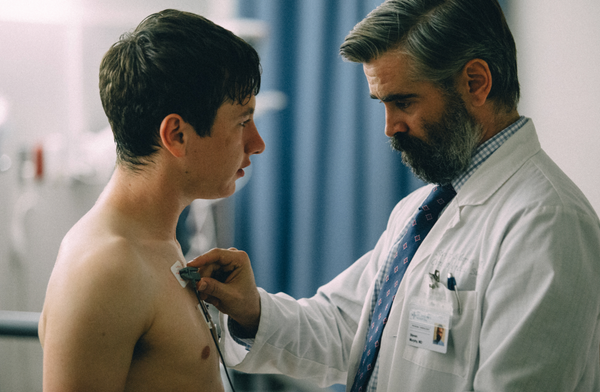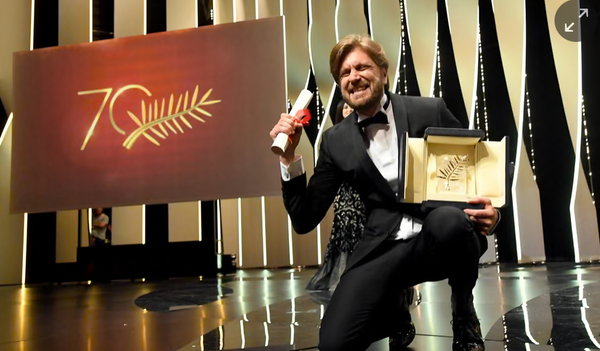At the BFI London Film Festival following the premiere of Bugonia, Film Ireland Correspondent Shannon Cotter sat down with director Yorgos Lanthimos and stars Emma Stone and Jesse Plemons to explore the film’s darkly comic take on human nature, belief, and connection.
Sharing the room with some of the buzziest cast and crew in London should feel a bit nerve-wracking to say the least. However, bustling with warmth and wit, Jesse Plemons, Emma Stone and Yorgos Lanthimos can only be described as incredibly down-to-earth (no pun intended). That’s how it feels sitting in the Corinthia Hotel among several journalists after the London premiere of Bugonia - another win for the Element Pictures produced feature which has garnered widespread praise for Lanthimos, and Plemons and Stone’s spellbinding performances. With a representative whoop for Film Ireland and a quick introduction, we get right into it.
Yorgos, a lot of your films are as intense as Bugonia, but Bugonia has more of a thriller plot as well as the mechanics that go along with that. Did this change your storytelling instincts?
YL: I think all films, I try to allow them to lead me to a way of handling them, whatever that may be - from developing the script to casting to choosing the locations and how we film them and what kind of sound or music we use. So it was the same in this case.
Emma, in Venice you were asked how you keep from becoming an “alien” being such a famous actor and you talked about how you have this avatar of yourself which is the public persona and then yourself when you’re not in the public eye - does this get easier or more difficult over the years?
ES: That was an oversimplification as if I’m behaving in a plastic suit of myself (laughs). I don’t mean it quite like that. I think it’s more like there’s a sort of a separation that happens as time goes on in order to not take things too personally. It’s the same thing as getting a bad review. You’re like “that’s okay, that’s part of what my job is.” But it doesn’t mean it’s who I am necessarily or that it’s supposed to affect something to your core.
You can always take notes, that’s good but I do think actually it gets better as time goes on or as you get older. That’s for anyone in any social interaction or whatever. You beat yourself up a little less after you say something stupid at a party - hopefully - instead of ruminating over it like you did when you were younger.
There’s a line in the film where Teddy says to Don that “everything’s for a reason” but there’s a sense of desperation [from him] that he’s trying to justify everything that’s happened to him because it’s unbearable to cope with otherwise. What are your thoughts on the role of fate in the film and real life?
JP: Sometimes that notion is nice because it sort of takes you off the hook a little bit and that’s a nice feeling, that it’s all predestined or someone else is pulling the strings. But then you look at horrific events and, just me personally, if you look at that idea as whole that becomes really difficult because there seems to be a lot of really random terrible things that happen in life. I tend to not live my life necessarily in that way, but at the same time, life and my perspective is a constant dance between this sort of illusion of control and the fact that there are so many things in life that are beyond your control, And we do tend to kid ourselves with how much we are in control.
The characters start off as archetypes before the film develops them further - why was it important for you to do it that way instead of presenting them as fully complex humans from the start?
YL: I think it’s built in the core structure of the film. One very important theme in [Bugonia] is this notion, this idea that we have in our mind about other people, other cultures, other worlds. Whatever we imagine or think about others or ourselves, even. The structure of the film in itself is presenting these two archetypes and then the process of peeling [back] those layers and discovering these biases that we have about other people. It challenges that and I think it’s important to do that especially in our time because of technology that enforces you to strongly believe the things you already believe and makes it hard to accept anyone else’s opinion. And again, that’s where the film goes to, having these two radically different people seemingly get into a room and understand there might be some truth to each other’s claim and how can that work, how can that be accepted or not, and at some point, maybe figure out they do have a similar goal but the way to achieve it is different. I think it speaks about all these things.
It’s explaining conspiracy theorists not by their theories, but by their personality and history.
YL: Well to be honest the conspiracy thing is a quick way to describe the film for people that haven’t seen it, like a logline. But I think the core of the film is not about that, it’s about many more important issues and about human nature and humanity itself. The conspiracy theories is just a jumping off point.
JP: I think take the term “conspiracy theorist” out of it. These are two people with drastically opposed beliefs as far away as you can get and that’s the world right now - we’re split. I mean it’s more complicated than that generalisation but the thing that I think is interesting that the film does when you’re watching it is both Teddy and Michelle make statements that, in my opinion, are objectively true. And I think we’re in a time right now where it’s very hard for all of us to hold two opposing truths at once. It all has to be this or that and if you’re with this school of thought, (laughs) I’m with you or you can get the fuck out of here.
That’s interesting to me that it presents the audience with that. What do you do with that? Because multiple times in the movie, Michelle says something that’s just true. That makes you uncomfortable.
What are those truths?
Michelle’s final monologue about the suicidal sort of tendency that humans have and their destruction of the planet…that feels true. All of Teddy’s comments about the sort of social class he and Don are in, a lot of those statements are true. Like Yorgos was saying earlier, there are people that are out to use a large portion of society just for their own gain.
To me, it feels like humanity is a failed experiment these days. How do you keep up hope for us and yourself in a world like this?
JP: What I always come back to, it’s not much, but in the bigger scheme of things, it has an effect on me [are] small human interactions. Anything human, especially if it’s someone that if you actually get into it, you probably would find plenty of things to argue or fight or disagree about. But nowadays, a nice interaction with a stranger goes a long way for me.
ES: I think connection is the greatest source of hope to me. I mean there is a sort of inevitability that the only guarantee we have, no matter how it happens, is that we are going to die. So the hopelessness...how do you maintain hope, knowing that no matter what you do, you will die? I think that’s a question that’s as old as time or that’s inevitable.
And so, looking at the planet the way it is, I’ll tell you what will, for sure, live on and regenerate and that’s covered very beautifully in the film - our planet. (Laughs) When the parasite of humanity is inevitably extinguished, our planet will flourish and that’s hopeful.
JP: I mean, I have hope in the younger generation and there are a lot of brilliant people that care so much out there. There are. So to try and focus on that.
Bugonia is out across Irish cinemas now.

